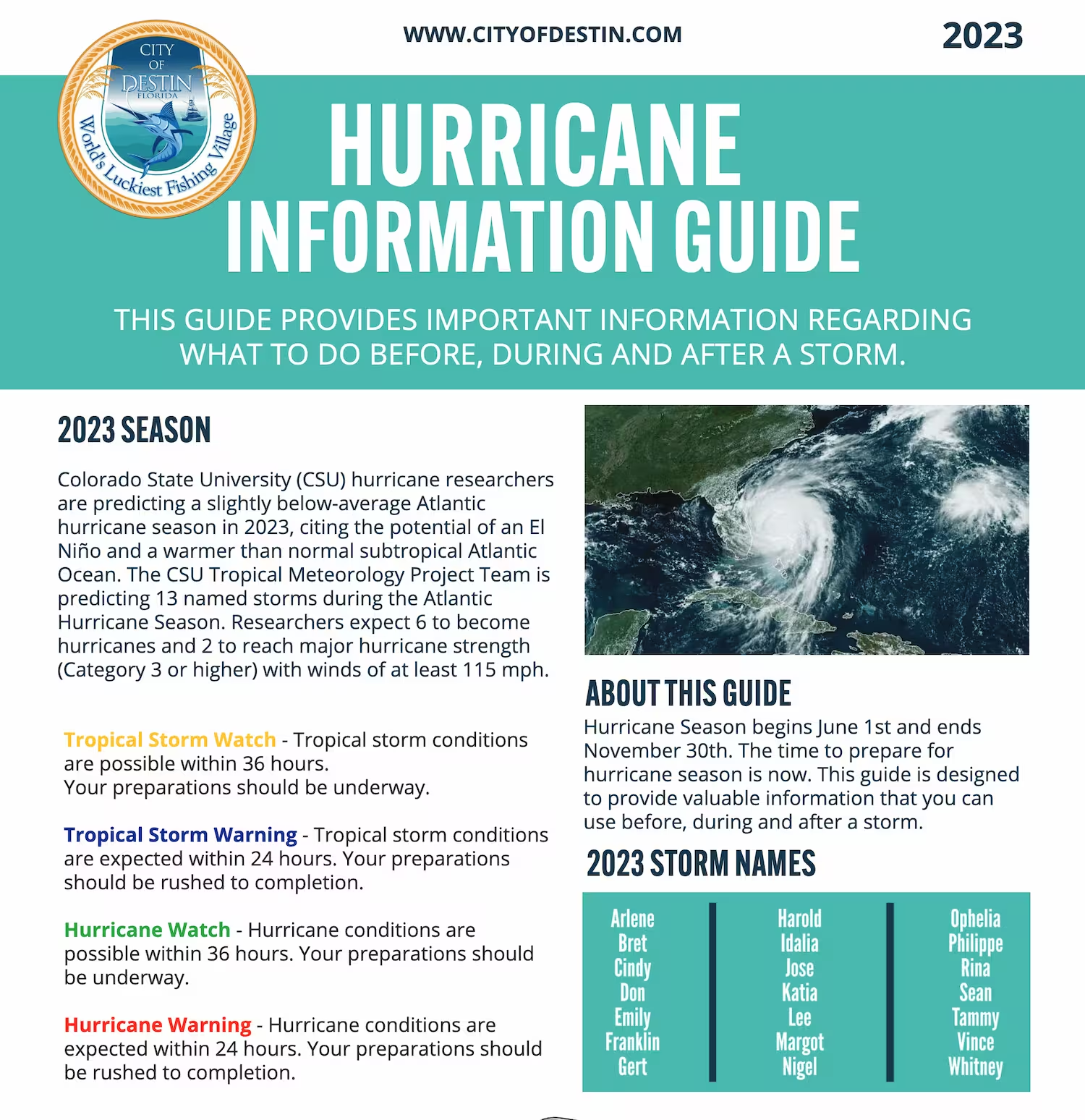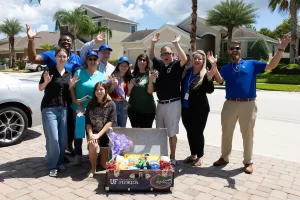Source: City of Destin 2019 Hurricane Guide
Destin,
FL – Hurricane season begins June 1, and ends November 30. The 2019 City of Destin Hurricane Guide is now available on the City of Destin website and City of Destin Government Facebook page. This guide is designed to provide valuable information that you can use before, during, and after a storm. For more information please visit: https://www.cityofdestin.com/DocumentCenter/View/10333/2019-Destin-Hurricane-Guide
NOTE FROM THE EDITOR:
We thank the City of Destin for allowing us to print some of the information in their outstanding Hurricane Guide. For our readers, we remind you that wherever you may be in our region, the advice included here to develop a plan, as well as the other information on hurricane preparedness we are including in this edition is important regardless of where you live and we hope you will read it and take action. Last year, Hurricane Michael devastated cities and towns throughout the region and those of us who were not affected were very lucky indeed, because many of our brothers and sisters in those areas are still suffering and it will take many years for the full recovery of those areas. Preparation is of extreme importance.
DEVELOP Develop A PLAN:
Hold A Family Meeting
Discuss the hazards of hurricanes. Explain some of the things you will be doing to keep everyone safe. Start a written list of things you will need to take care of before hurricane season and encourage everyone in the family to contribute their ideas.
Discuss Whether You Will Need to Evacuate
This is the question that each family must answer. Therefore, it is of utmost importance to know which zone you are in. Shown on page 3 in this guide is Okaloosa County’s Official Evacuation Map for Destin. Determine where you live. As you can see, Okaloosa County Emergency Management officials will issue their recommendation for residents and visitors to evacuate based on where they live and the storm conditions. Where will you go if an evacuation order is given? Going to a family or friend’s house or hotel outside the evacuation area is your best choice. If you choose to go out of town, do so well in advance of the storm. Since shelters (see page 6) provide for only basic needs, this should be your choice of last resort.
Ensure Your Assets Are Protected with Flood Insurance
Inventory your home possessions and videotape, record or photograph items of value. Review your insurance policies before hurricane season starts to ensure you have adequate coverage. Once a hurricane watch has been issued, insurers will not issue new or additional coverage.
Assess Your Home for Vulnerable Areas
Do a walk-through of your home and property to evaluate your roof, windows, garage door, landscaping, etc., and determine what actions you will need to take to make your home safe. DO NOT CUT LIMBS AND BRANCHES IF A HURRICANE IMPACT IS IMMINENT. If debris cannot be collected before a storm hits the debris can become dangerous projectiles in strong winds. It is important to clear debris from your home year-round, and not wait until there is a hurricane threat. PREVENT FLOODING!
Do not dump or throw anything into inlets, ditches, swales or outfalls. Even grass clippings and branches can accumulate and plug drain channels. If you see dumping or debris in these areas, contact the City of Destin Code Compliance Department at 654-1119 or after hours at 279-6658.
Secure Your Home
Decide what actions you will need to take to protect your home and your property (shutters, generator, etc.), and to keep as comfortable as possible during a recovery. Put up shutters if you have them. Turn refrigerator to lowest setting and lower the A/C temperature. Charge cell phones and electronic devices. Place flashlights and batteries throughout the house and keep one with you. Do not use candles.
Make A Plan for Your Pets
Determine how you will address your pet’s needs, and make a plan in case you have to evacuate. Pets are not allowed at public shelters. Try to take your pet to a veterinary hospital, boarding kennel, family or friends who live outside the evacuation area. The web sites for the American Humane Society, AKC Companion Animal Recovery, and Florida Emergency Management have great tips for preparing your pet. If you are planning to evacuate your pet with you when you leave, check out this helpful website www.ready.gov/animals. This site will let you know which hotels will accept traveling pets/service animals.
Notify Others of Your Plans
Let family or friends know what your hurricane plan is so they can check on you in the aftermath of a storm. Establish an out-of-town contact.
Vehicle Storage & Protection
Decide where you will store or park your vehicle, boat or RV. Gas up your vehicles. Move vehicle(s) into a garage or next to a building; avoid parking near trees and utility poles. Check your vehicle insurance policy and keep it in the same safe place as your homeowner’s policy.
Determine Whether Anyone in Your Home Has A Special Medical Need or Is Vulnerable in An Emergency
Discuss whether anyone has special needs in an emergency due to a medical condition, or because they are elderly or disabled. Make arrangements in advance to accommodate those needs, including their prescriptions. Gather your emergency kit and keep it handy.
Gather Your Supplies
Determine your family’s food and water needs. Assemble your hurricane kit accordingly. The new rule of thumb is to have about seven days of food and water per person. Fill water containers, bathtubs and sinks. Freeze water jugs and fill ice chests with ice. Be sure to stock up!



